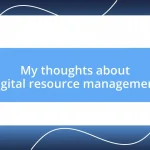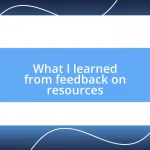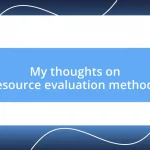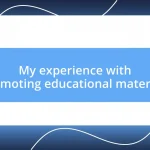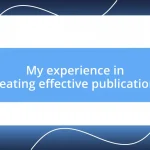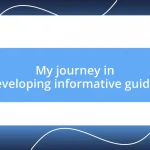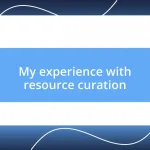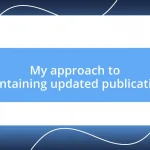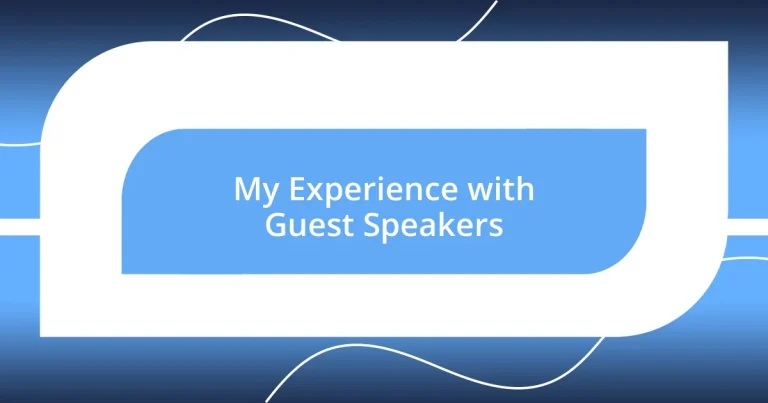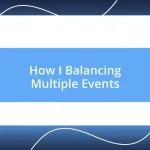Key takeaways:
- Guest speakers provide real-world insights that enhance theoretical knowledge and inspire audiences through personal stories and experiences.
- Effective preparation and engagement techniques, such as conducting background research and facilitating interactive discussions, maximize the impact of guest speakers.
- Post-event follow-ups and evaluations, including gathering feedback and fostering ongoing conversations, are essential for building relationships and assessing a speaker’s influence.
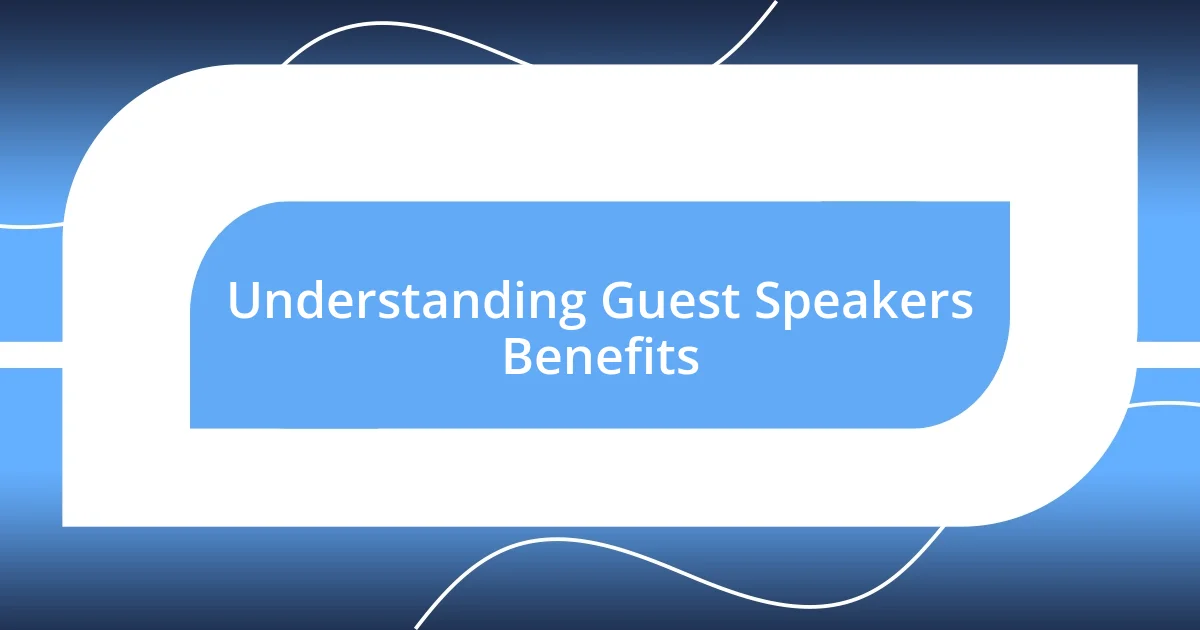
Understanding Guest Speakers Benefits
Having guest speakers can truly transform an experience, bringing fresh perspectives that you often can’t get from textbooks or regular lectures. I remember attending a workshop where a remarkably successful entrepreneur shared her journey. Her story about overcoming failures resonated deeply with me; it ignited a spark that made me rethink my approach to challenges.
One of the most significant benefits of guest speakers is their ability to connect theory with real-world experience. I once heard a renowned scientist discuss the importance of their work in a way that made complex concepts feel relatable and exciting. It’s moments like these that foster enthusiasm within a group, inspiring individuals to dive deeper into their interests.
Moreover, guest speakers often open doors to networking opportunities that remain valuable long after the talk is over. I recall a chance encounter with a guest speaker at a local college event, which led to an internship that changed my career path. Isn’t it fascinating how a single conversation can lead to extraordinary possibilities?
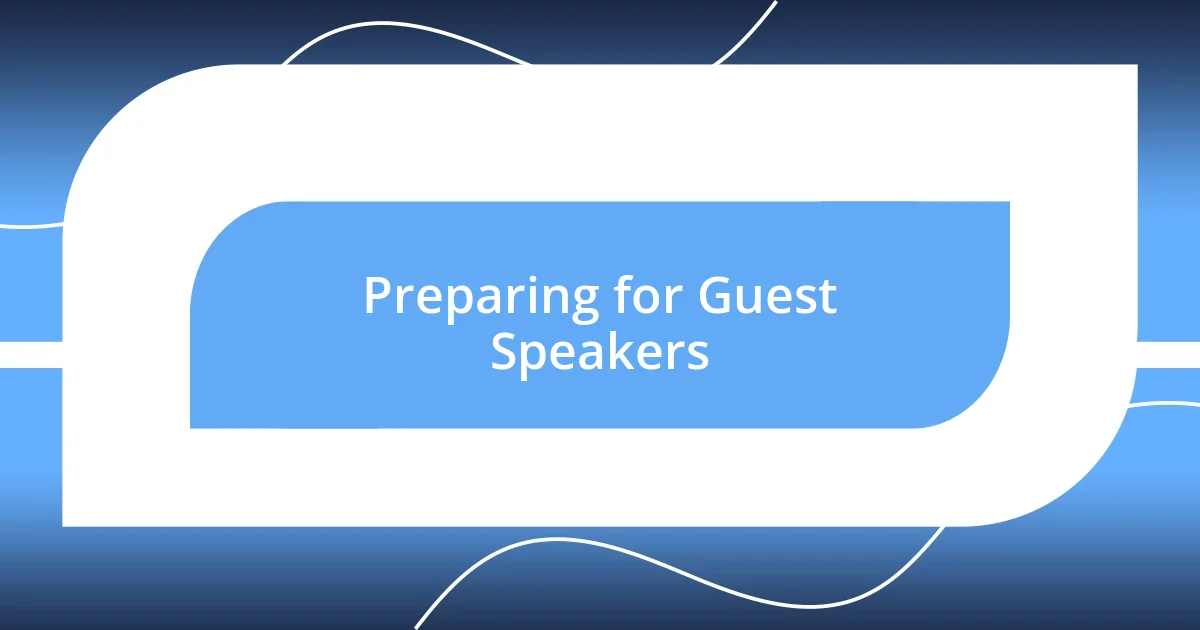
Preparing for Guest Speakers
Preparing for guest speakers is about creating an environment that maximizes their impact. I always found that doing a bit of background research on the speaker can make a significant difference. By understanding their expertise and previous work, I can engage more thoughtfully during the session. I remember attending a talk by a filmmaker, and knowing his previous projects allowed me to ask more meaningful questions, which not only benefited me but also delighted him, creating a valuable dialogue.
Here’s a quick checklist I use to prepare for guest speakers:
- Research the speaker’s background and expertise.
- Prepare specific questions related to their work.
- Share speaker information with attendees to spark interest.
- Set the technical setup in advance to avoid interruptions.
- Encourage attendees to think of their own questions.
These steps always help me feel more connected and proactive, ensuring that both the speaker and the audience have an enriching experience.
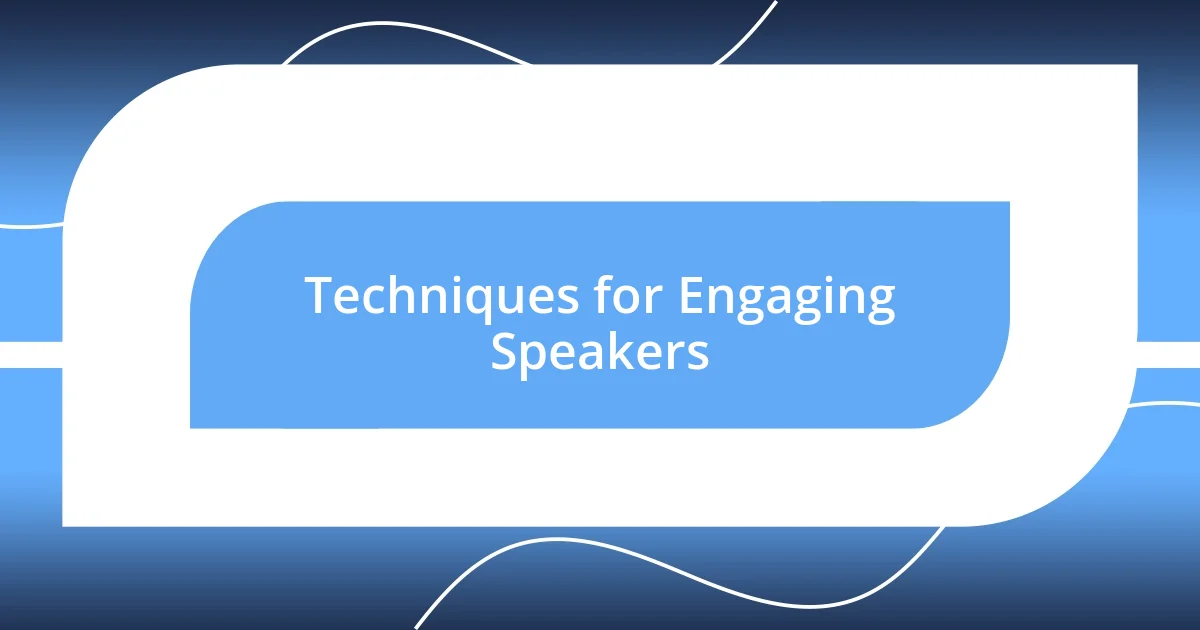
Techniques for Engaging Speakers
When it comes to engaging guest speakers, one of the most effective techniques I’ve discovered is to foster an interactive environment. For instance, arranging small group discussions before or after a talk can pave the way for a more intimate and engaging experience. I remember an event where we split into teams, and it sparked spontaneous conversations that made the speaker’s points come alive in our minds. Such dynamics encourage speakers to share personal anecdotes, which can deepen the audience’s connection to their message.
Another technique is to use technology to enhance engagement. Incorporating tools like live polls or Q&A apps can create a level of interactivity that truly captivates attendees. I once participated in a seminar where the speaker used a live poll to gauge our opinions, which not only made us feel involved but also tailored the discussion to our interests. The energy in the room shifted dramatically as we felt like active participants rather than passive listeners. It’s amazing how a simple technological tool can elevate the exchange.
Lastly, storytelling remains a powerful tool for capturing interest. I distinctly remember a guest lecturer who began her session with a personal story about her journey in a challenging industry. It was authentic and relatable, drawing us in from the start. The way she shared her struggles felt like we were sitting in a cozy coffee shop, listening to a friend rather than just attending a lecture. This technique reminds me that it’s often the emotional connections that leave a lasting impact.
| Technique | Description |
|---|---|
| Interactive Discussions | Encouraging group dialogues before or after talks to create personal connections with the speaker’s content. |
| Technology Integration | Using tools like live polls or Q&A apps to engage the audience actively in the discussion. |
| Storytelling | Having speakers share personal stories to emotionally connect with the audience and make the content more relatable. |
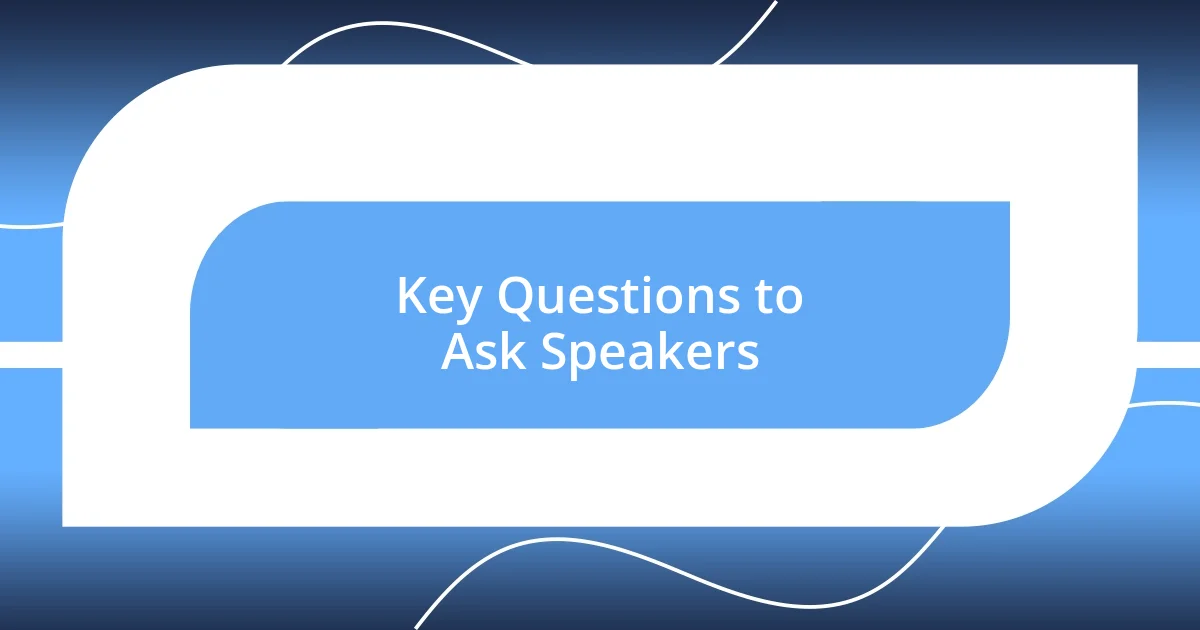
Key Questions to Ask Speakers
When preparing to engage a guest speaker, one crucial question I like to ask is, “What inspired you to pursue this path?” Understanding the driving force behind their journey not only helps spark an interesting discussion but also reveals the speaker’s passion. I recall a time when I posed this question to a tech entrepreneur, and his story about overcoming early obstacles was not just engaging; it made his lessons resonate on a deeper level.
Another important question is, “What do you see as the biggest challenge in your industry today?” This query often opens a valuable dialogue, allowing speakers to share insights based on current trends and experiences. I remember attending a seminar where this question led to a candid discussion about the evolving landscape of social media. Hearing the speaker’s perspective on navigating changes made me rethink my own strategies while engaging with various platforms.
Lastly, I always find it insightful to ask, “Can you share a meaningful experience that shaped your career?” This question usually leads to unforgettable stories that humanize the speaker and provide relatable lessons. In one instance, a guest shared a moment of failure that ultimately became a stepping stone for greater success. It struck a chord with everyone in the room, and I could see many nodding in agreement, reflecting on their own journeys. Asking the right questions can create an atmosphere of connection and learning that benefits both the speaker and the audience.
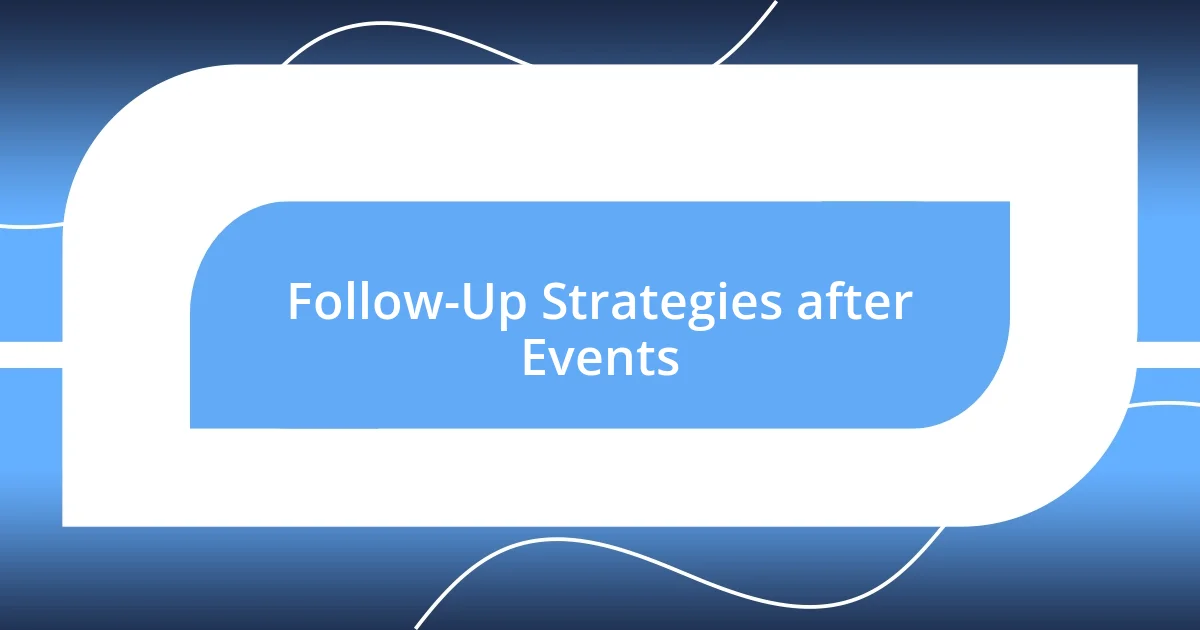
Follow-Up Strategies after Events
After an event, the significance of following up with both the speakers and attendees can’t be overstated. I remember one time when I crafted personalized emails to each speaker thanking them for their insights. Not only did it strengthen my professional relationships, but it also opened doors for future collaborations. Have you considered how a simple thank you can create a foundation for ongoing dialogue?
Additionally, I find that sharing feedback from the audience can greatly benefit both speakers and future events. Once, I compiled a summary of audience impressions and suggestions and shared it with a guest speaker. The look of appreciation on her face was priceless. She expressed how it helped her refine her approach for subsequent talks. If you’ve gathered feedback, why not share it? It not only fosters a sense of community but empowers speakers to grow.
Lastly, engaging attendees after the event is equally important. I often create a follow-up discussion thread on social media platforms, inviting everyone to share their key takeaways. During one such thread, a participant brought up a topic the speaker had touched on, and it reignited a lively debate. Have you thought about how keeping the conversation alive can enhance the learning experience for everyone involved?
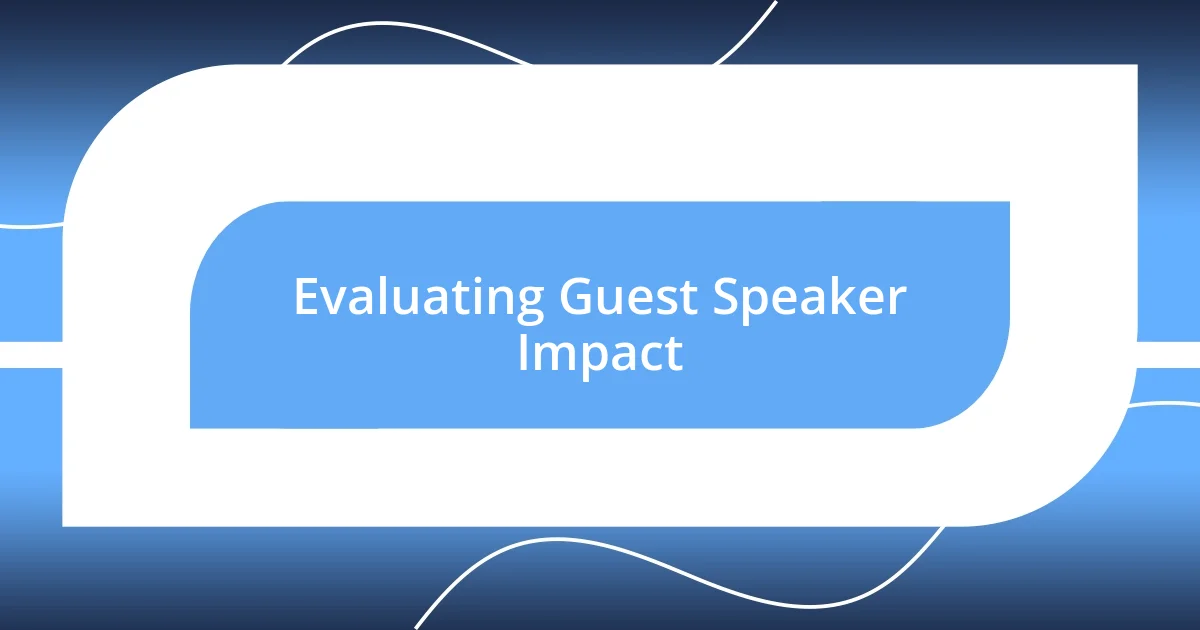
Evaluating Guest Speaker Impact
Evaluating the impact of a guest speaker often involves gauging audience engagement and response. I vividly recall a presentation by a renowned author, who used storytelling to draw us into her world. The room was charged with emotion, and I noticed people nodding in agreement, some even moved to tears. How can you measure impact more effectively than by witnessing genuine human reactions?
Another way to assess impact is through post-event surveys. After one of my events, I sent out a simple questionnaire asking attendees about their favorite moments and key takeaways. The feedback was overwhelmingly positive, but one comment stood out—a participant said the speaker gave her the courage to pursue a passion she’d shelved for years. Doesn’t that kind of transformation indicate true effectiveness?
Finally, I believe that lasting connections can signal the speaker’s impact as well. After a tech webinar, I found that many participants connected with each other on LinkedIn to further discuss the topics raised. Witnessing this ripple effect reminded me that when a speaker resonates deeply, it creates not just immediate involvement but sparks ongoing conversations. Isn’t the goal of any good speaking engagement to inspire continued dialogue?
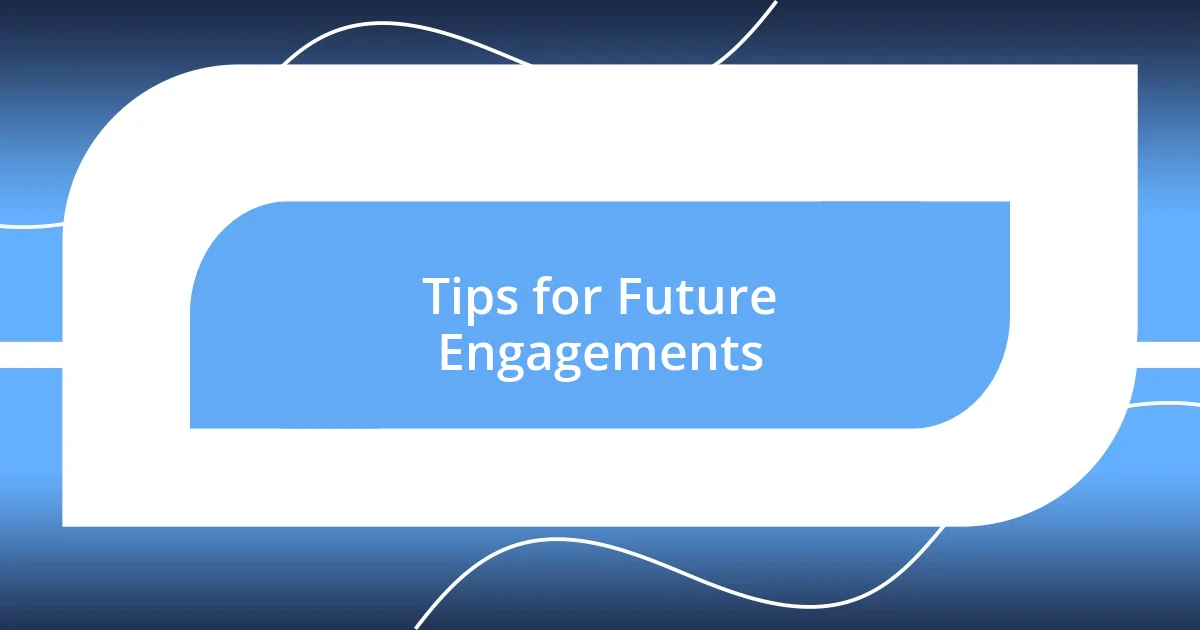
Tips for Future Engagements
In my experience, one of the best ways to ensure successful future engagements is to establish clear communication with potential speakers well in advance. For instance, I once organized an event where I had extensive pre-event discussions with a keynote speaker. This not only helped align our visions but also made the speaker feel genuinely valued and involved in the planning process. Have you considered how efficient communication can set the tone for the entire event?
Another tip is to seek diverse perspectives when selecting guest speakers. I recall a particularly enlightening event where we invited speakers from different fields. The varying viewpoints created a vibrant, multifaceted discussion that left attendees buzzing with ideas. Wouldn’t it be interesting to see how blending different expertise can enrich the audience’s experience?
Lastly, I always advocate for a debrief session after the event, which has proved invaluable in my journey. Reflecting on what went well and what could be improved helps build a stronger foundation for future events. During one debrief, we realized that a simple shift in the Q&A format could elevate participant engagement significantly next time. Have you thought about how a little reflection can pave the way for more impactful experiences?
